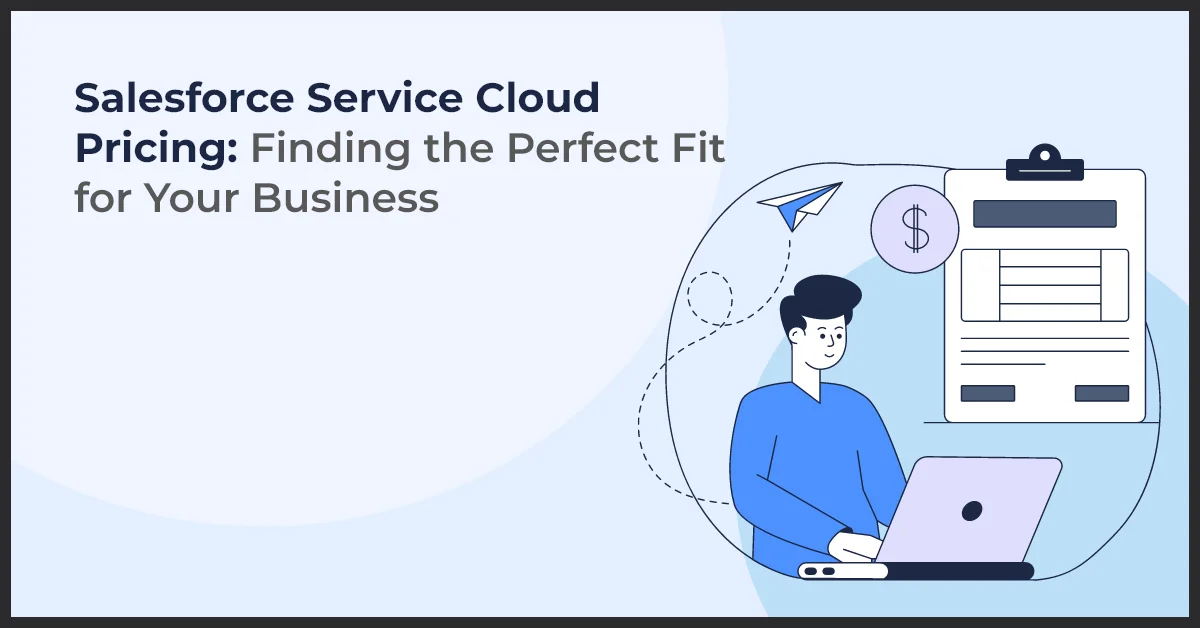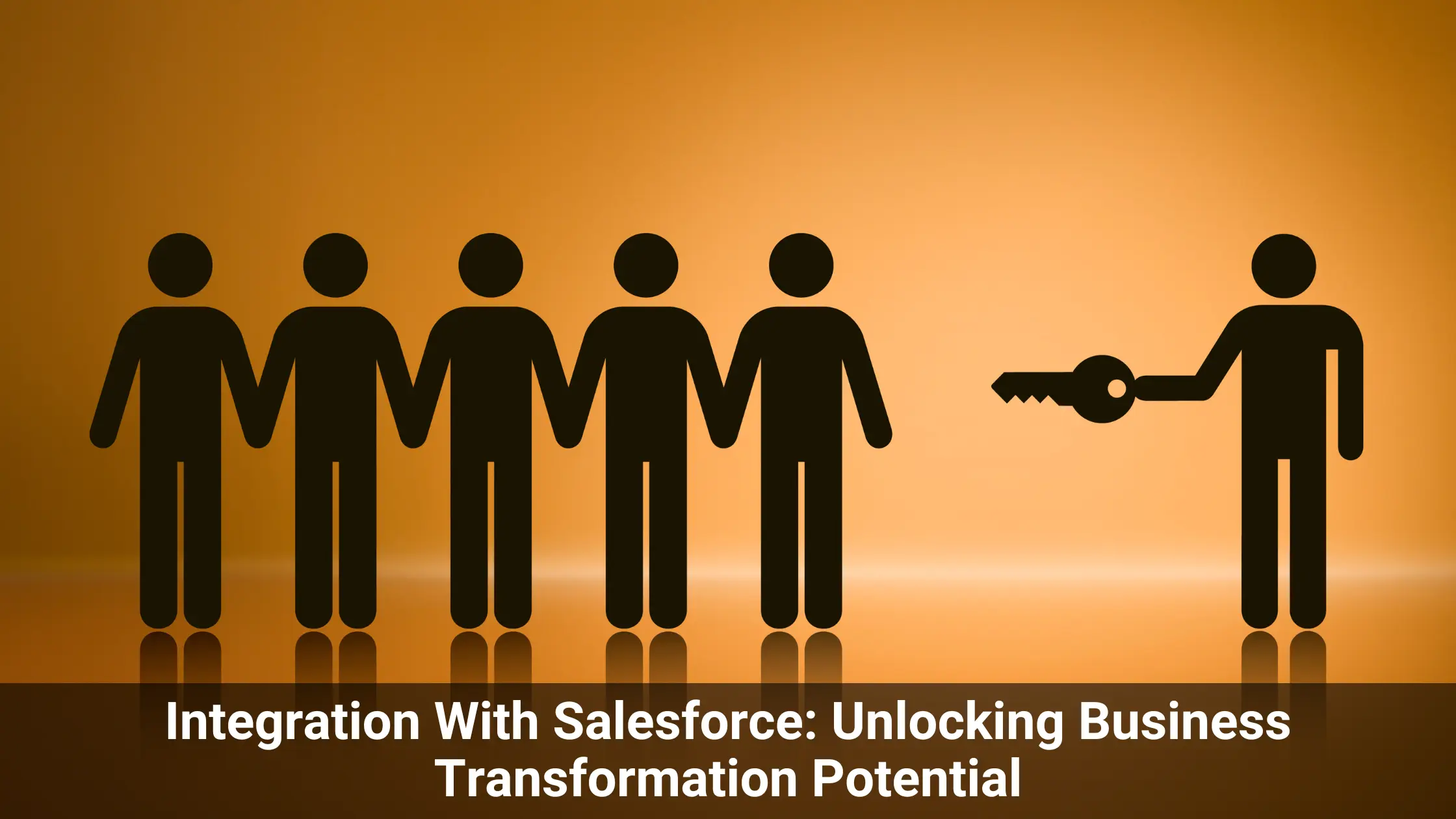Salesforce Service Cloud Pricing: Finding the Perfect Fit for Your Business

Table of Contents
Salesforce stands out as a leading cloud-based CRM platform, offering comprehensive solutions for effective customer relationship management. From sales and marketing to dedicated customer service support, Salesforce delivers an all-encompassing solution.
Service Cloud is Salesforce's dedicated customer service software solution. It empowers businesses to provide excellent customer support across various channels, including phone, email, social media, and live chat. With features like case management, knowledge base, and AI-powered analytics, Service Cloud helps businesses deliver exceptional customer experiences.
Significance of Pricing in Decision-Making
Choosing the right customer service software involves critical decisions, with pricing playing a pivotal role. This guide delves into Salesforce Service Cloud pricing options, covering standard plans, advanced enterprise options, factors influencing pricing decisions, and tips for optimizing your investment.
Whether you're a small business or an enterprise, finding the perfect pricing plan for Salesforce Service Cloud is crucial. Let's explore the options and take your customer service to new heights!
Salesforce Service Cloud Features
The Salesforce Service Cloud offers many features to revolutionize how businesses handle customer service. These comprehensive tools allow you to exceed customer expectations, streamline processes, and increase productivity.
- Case management and routing: Salesforce Service Cloud's robust case management system enables you to track, prioritize, and assign customer inquiries effortlessly. Efficient routing ensures that every case is directed to the right person, providing prompt resolutions.
- Knowledge base and self-service portals: Empower your customers with self-service options through a comprehensive knowledge base. You can reduce support costs and enhance customer satisfaction by providing easy access to answers and resources.
- Omni-channel communication capabilities: Communicate with customers seamlessly across multiple channels, including email, phone, social media, and chat. Salesforce Service Cloud brings all customer interactions into a centralized platform, ensuring consistent and personalized service.
- Workflow and process automation: Automate repetitive tasks and streamline workflows with Salesforce Service Cloud's automation capabilities. Increase efficiency, reduce manual efforts, and allow your team time to focus on more strategic initiatives.
While these robust features bring significant value to your customer service operations, it's essential to understand their impact on pricing considerations. As each organization's requirements differ, choosing the right features and their corresponding editions will determine the cost implications for your business.
Salesforce Service Cloud Editions
Salesforce Service Cloud offers different editions to meet the varying needs of businesses.
Diverse Editions in Salesforce Service Cloud
1. Essential Edition: Perfect for small businesses looking for basic customer service functionality.
2. Professional Edition: Enhanced features and customization options are ideal for growing businesses.
3. Enterprise Edition: Designed for large enterprises and provides advanced functionality and scalability.
4. Unlimited Edition: Offers unlimited customization options and premium support.
Analysis of Features and Constraints Across Service Cloud Editions
- Essential Edition focuses on core customer service capabilities but may lack advanced features.
- Professional Edition includes additional features like case management and automation.
- Enterprise Edition offers advanced features such as AI-powered service analytics and omni-channel support.
- Unlimited Edition provides unlimited customization options, premium support, and features like sandbox environments.
Service Cloud Editions: A Quick Pricing Overview
Understanding the pricing structure is crucial for making an informed decision. The cost of each edition varies based on the included features and the level of support offered. For an accurate and detailed pricing comparison, it is recommended to consult Salesforce's official pricing page. This will provide a clear overview of the costs associated with each edition, allowing businesses to align their budget with the specific features and support they require.
Salesforce Service Cloud Implementation
Implementing Salesforce Service Cloud is crucial in maximizing its potential and ensuring seamless integration with your business processes. The implementation process involves various considerations that directly impact pricing. It is essential to understand the significance of implementation when considering Salesforce Service Cloud pricing.
Importance of Implementation in Pricing Considerations
The implementation phase is vital in determining the overall cost of Salesforce Service Cloud. A successful implementation ensures the platform is customized to address your business needs. It involves setting up and configuring various features and functionalities, allowing you to manage your customer service operations effectively.
Overview of Implementation Process and Requirements
The implementation process begins with a thorough assessment of your business requirements. This helps identify the essential features and functionalities that must be integrated into Salesforce Service Cloud. After the initial assessment, a team of experts will work closely with you to design and deploy the system according to your unique needs. This process may involve data migration, integration with existing systems, and user training.
To successfully implement Salesforce Service Cloud, you must ensure your organization has the necessary infrastructure and resources. This may include hardware, software, and adequate human resources to handle the implementation process effectively.
Explanation of Potential Implementation Costs and Factors Affecting Pricing
The costs associated with implementing Salesforce Service Cloud can vary depending on the complexity of your business requirements and the scale of implementation. Factors such as the number of users, data volume, and customizations needed can impact the overall pricing.
Additionally, the involvement of third-party consultants or Salesforce implementation partners may incur additional costs. While their expertise facilitates a streamlined implementation process, it is crucial to consider these expenses when budgeting for Salesforce Service Cloud implementation.
Salesforce Service Cloud Licenses
Choosing the right license for your Salesforce Service Cloud implementation is essential to meet your organization's unique needs. Understanding their features and pricing implications is critical with various license types available.
Different license types available for Salesforce Service Cloud
Salesforce Service Cloud offers a range of licenses to cater to the diverse requirements of businesses. These licenses include:
- Service Cloud Lightning Professional: Suitable for small businesses looking for core customer service functionality.
- Service Cloud Lightning Enterprise: Ideal for mid-sized organizations that require advanced customization and automation capabilities.
- Service Cloud Lightning Unlimited: Designed for large enterprises with complex service requirements, offering unlimited customization and enhanced support options.
Deciphering How User Licenses Influence Pricing
Each user license type has its own features and price points. Understanding the impact of different user licenses on the overall pricing of Salesforce Service Cloud is crucial.
The user licenses available for Salesforce Service Cloud include:
- Full User License: Offers comprehensive access to all Service Cloud features, suitable for users who require complete functionality.
- Lightning Platform License: Provides limited access to Service Cloud features, suitable for users who need basic functionality.
- External User License: Allows external users, such as partners or customers, to access specific Service Cloud features, enabling seamless collaboration.
Analyzing License Features and Pricing Differences
Comparing different licenses' features and pricing implications is crucial to ensure you select the most cost-effective option for your organization. Consider factors such as:
- Access to advanced features like service console, knowledge base, or AI-powered analytics.
- Customization capabilities enable tailored experiences for your agents and customers.
- Integration options with other Salesforce clouds or third-party applications.
- Scalability to accommodate your organization's future growth.
Salesforce Service Cloud Cost
When opting for Salesforce Service Cloud, understand costs: factors influencing total cost, subscription pricing, hidden costs, and the impact of features and licenses.
Factors Affecting the Overall Cost of Salesforce Service Cloud
Various factors influence the total cost of Salesforce Service Cloud. These encompass the number of users, required features and customizations, data storage needs, and the desired level of support. A thorough understanding of these factors is essential for estimating the investment required.
Navigating the Subscription-Based Pricing Model
Salesforce Service Cloud follows a subscription-based pricing model, enabling businesses to pay for the services they require monthly or annually. This model provides flexibility, allowing you to adjust your subscription as your needs change. Reviewing the available editions and their respective pricing plans is important to select the most suitable option for your business.
Revealing Hidden Costs in Pricing Analysis
While the subscription-based pricing model provides an overview of the upfront costs, it is essential to consider potential hidden costs. These may include additional data storage requirements, the need for customizations or integrations, and any ongoing maintenance fees. Carefully analyzing these potential hidden costs will ensure you comprehensively understand the overall pricing.
Understanding the Relationship Between Features, Licenses, and Pricing
Features and licenses play a significant role in determining the pricing of Salesforce Service Cloud. Different editions offer diverse features, and the number of licenses needed varies based on the number of users. Evaluating your business requirements and prioritizing the necessary features is crucial to estimating the overall cost accurately.
Salesforce Service Cloud Support
Regarding Salesforce Service Cloud, getting the proper support can make all the difference in ensuring a smooth and efficient implementation. Salesforce offers various support options to cater to the unique needs of businesses:
- Standard Support
With Salesforce Service Cloud, you get access to standard support included in your subscription. This support provides assistance with general inquiries, access to a vast knowledge base, and access to the Salesforce Success Community, where you can connect with other users and experts.
- Premier Support
If you require an enhanced level of support, Salesforce offers Premier Support at an additional cost. With Premier Support, you can access a dedicated team of Salesforce experts who provide personalized assistance, priority access to support resources, and faster response times.
- Additional Support Add-ons
In addition to standard and premier support, Salesforce offers various add-ons to customize your support experience further. These add-ons include 24/7 support, on-site support, and access to a designated Technical Account Manager (TAM) for strategic guidance.
Considering support costs is essential in pricing decisions for Salesforce Service Cloud. While standard support is included in your subscription, premier support and additional support add-ons come at an extra cost. It's crucial to evaluate your business requirements and budget to determine the level of support that aligns with your needs.
Choosing the right support option can increase efficiency, reduce downtime, and a higher return on investment for your Salesforce Service Cloud implementation.
Salesforce Service Cloud Customization
Salesforce Service Cloud offers various customization options to tailor the platform to your business needs. These customizations allow you to create a personalized and efficient experience for your customers and agents. Let's explore some of the key customization options available with Salesforce Service Cloud:
Exploring Customization Choices in Salesforce Service Cloud
Custom Fields and Objects
You can create custom fields and objects to capture additional data specific to your business processes with Salesforce Service Cloud. This helps you gather relevant information and provides a comprehensive view of customer interactions.
Workflows and Process Automation
Automating repetitive tasks and streamlining processes is possible through workflows and process automation in Salesforce Service Cloud. You can define triggers, rules, and approval processes to automate various actions, freeing your team's time for more critical tasks.
Customizable User Interface
Salesforce Service Cloud allows you to customize the user interface based on your unique requirements. You can modify page layouts, add custom buttons, and create custom tabs to present the information and functionalities that are most important to your agents. This enhances usability and productivity.
Impact of Customization on Pricing in Salesforce Service Cloud
Customization options may impact the pricing of Salesforce Service Cloud. The extent and complexity of customizations required may entail additional implementation and maintenance costs. It is essential to consider your customization needs and evaluate the associated pricing implications when choosing the right Salesforce Service Cloud edition for your business.
Salesforce Service Cloud Add-ons
Enhance your Salesforce Service Cloud experience with these powerful add-ons and features:
- Integration with Other Salesforce Products
Seamlessly integrate with other Salesforce products like Sales Cloud and Marketing Cloud to create a unified platform for your entire sales and customer service operations.
- AppExchange Applications and Third-party Integrations
Choose from a wide range of applications available on AppExchange to extend the functionality of your Service Cloud. Integrate with third-party systems and tools to streamline workflows and provide better customer service.
- Understanding How Add-ons Affect Pricing
When considering add-ons for your Salesforce Service Cloud, evaluating the costs associated with each add-on is important. Consider the potential impact on overall pricing and ensure the added features align with your business requirements and objectives.
Salesforce Service Cloud ROI (Return on Investment)
Investing in Salesforce Service Cloud can provide a significant return on investment for your business. Not only does it enhance your customer service operations, but it also offers numerous cost savings and business benefits.
Understanding the Potential ROI of Salesforce Service Cloud
When considering the return on investment for Salesforce Service Cloud, it's important to assess the potential benefits it can bring to your organization. Some key aspects to consider include:
- Increased Efficiency: Service Cloud streamlines and automates various customer service processes, reducing the time and effort required to address customer issues and inquiries.
- Improved Customer Satisfaction: With Service Cloud, your agents have access to a comprehensive view of each customer's history and interactions, enabling them to deliver personalized and efficient support.
- Reduced Costs: Service Cloud's automation capabilities and self-service options can significantly lower your customer service costs by minimizing the need for manual interventions and agent resources.
- Enhanced Agent Productivity: Service Cloud provides agents with tools and features that streamline their workflows, allowing them to handle more customer cases in less time.
Analyzing Cost Savings and Business Benefits
Your organization can experience significant cost savings and business benefits by implementing Salesforce Service Cloud. Some examples include:
- Reduction in support costs: With self-service options and automation, customers can find answers to their questions without needing to contact your support team, saving valuable agent time and resources.
- Improved customer retention: With enhanced customer service, customers are more likely to remain loyal to your brand, reducing customer churn and increasing revenue.
- Increased cross-selling and upselling opportunities: Service Cloud provides agents with comprehensive customer data, enabling them to identify and capitalize on additional sales opportunities.
- Shorter resolution times: Service Cloud's efficient case management capabilities allow agents to resolve customer issues faster, increasing customer satisfaction and loyalty.
Salesforce Service Cloud Competitors
Regarding customer service software, Salesforce Service Cloud faces stiff competition from several key players in the market. These competitors include:
- Zendesk
- Freshdesk
- Kustomer
- Zoho Desk
- HubSpot Service Hub
Each competitor offers unique features and capabilities designed to enhance customer service operations.
Evaluating Pricing and Features: Salesforce Service Cloud vs Competitors
While Salesforce Service Cloud is known for its robust features and extensive customization options, it's important to consider how it compares to its competitors regarding pricing and features.
For example, Zendesk offers a range of pricing plans starting from $19 per agent per month, which may be more cost-effective for small businesses with limited budgets. On the other hand, Salesforce Service Cloud offers more advanced features and scalability, making it a better fit for larger enterprises.
Similarly, Freshdesk provides lower-priced plans with basic functionalities, while Salesforce Service Cloud offers a comprehensive suite of features for businesses with complex customer service needs.
Assessing Pricing as a Competitive Edge for Salesforce Service Cloud
While Salesforce Service Cloud may be priced higher than some of its competitors, it's important to consider the value it brings to the table. With its advanced features, integration capabilities, and extensive customization options, Salesforce Service Cloud offers a solution tailored to meet the unique requirements of businesses in various industries.
Moreover, the scalability and flexibility of Salesforce Service Cloud ensure it can grow and adapt alongside businesses, providing a long-term solution for customer service excellence.
While Salesforce Service Cloud faces competition, its robust feature set, customization options, and scalability make it a top customer service software market contender.
Conclusion
After exploring the various aspects of Salesforce Service Cloud Pricing, it is clear that understanding the pricing structure is crucial for making informed decisions.
Making an informed decision about Salesforce Service Cloud Pricing is of utmost importance. By understanding the different aspects discussed, you can ensure that the pricing structure aligns with your business requirements and budget.
Do you need further assistance or consultation on Salesforce Service Cloud pricing? Our team is here to help! Contact us for personalized guidance and ensure that you make the most profitable decision for your business.
Author Box
Shagun Sharma
Shagun Sharma is a content writer during the day and a binge-watcher at night. She is a seasoned writer, who has worked in various niches like digital marketing, ecommerce, video marketing, and design and development. She enjoys traveling, listening to music, and relaxing in the hills when not writing.
Frequently Asked Questions
Salesforce Service Cloud Pricing is tiered, offering different editions with varying features and capabilities to accommodate the diverse needs of businesses, from small enterprises to large corporations.
The cost of Salesforce Service Cloud is influenced by factors such as the chosen edition, the number of users, additional features required, and any customization or integration needs specific to the business.
Service Cloud Pricing is competitive, offering a comprehensive suite of features that align with diverse business needs, and businesses can evaluate the value against other customer service solutions in the market.
Generally, there are no hidden fees in the Service Cloud Pricing structure; costs are transparent, and businesses can work with Salesforce representatives to understand the total cost of ownership.
Salesforce Service Cloud offers subscription-based pricing models, with options for per-user pricing or enterprise-wide licensing based on business preferences and requirements.




